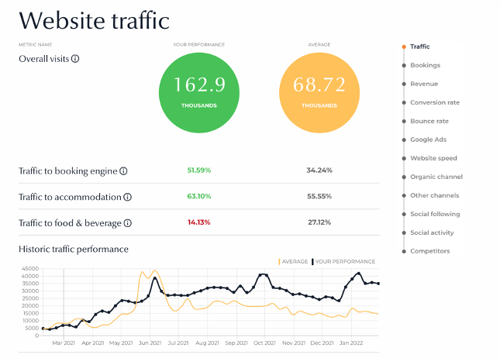Hotel websites. Important metrics to consider
Knowing which metrics to compare and how each one is relevant to your website performance and on-line marketing strategy can be daunting. In this article, we examine several key metrics to measure over time, ultimately helping to drive more direct bookings.

It doesn’t matter whether your property is a luxury hotel or an inn with rooms, using benchmarking data can really help you understand how your direct channel is performing in the context of the market and compared to your competitors. A well-constructed analytics infrastructure is the first step in collecting data from your on-line marketing efforts and tools like Hotel Benchmarking can help in translating your performance into a meaningful picture to help make more informed decisions.
TRAFFIC
One of the most widely-used performance metrics is the number of visits or sessions recorded to your website. It’s a performance metric used due to its simplistic meaning but it’s important because it confirms whether your marketing strategies are generating traffic to your hotel’s website. To discern whether you’re on the right track, remember metrics like visits should be viewed over time and not as a single snapshot. The average sessions for January 2022 from our community of 700+ hotels were 11,000, but that varies when we start to apply filters like star rating. For example, 5-star hotels recorded less sessions in January– 10,200, and 4-star hotels an average of 12,000 sessions. Location also plays a big part. European hotels recorded an average of 16,000 sessions in January, while hotels in the Middle East and Africa were just 4,000.

While star rating and location are just two factors that may affect the industry average, the more sessions your property is receiving, the greater the pool of potential customers sitting at the top of your booking funnel. If you’re consistently hitting sessions which are below average, think about marketing strategies that could drive more traffic to your website.
Identifying the number of visits to the booking engine as a percentage of total visits will help you understand how willing visitors are to begin the booking process on your website, and your booking engine conversion rate goes one step further in confirming how many of these visitors made a booking. A good user experience should facilitate the booking process, making it as effortless as possible.
REVENUE
Online revenue coming in directly via your website is important because it doesn’t come at the same high price that OTA or indirect bookings do with commissions that decrease overall profit. In order to maximise your profitability the greater the share of direct revenue from your own website/booking engine the better. In 2020, our sister company 80 DAYS analysed the performance of 67 four and five-star independent hotels to identify the share of revenue coming direct v indirectly. In 2019, pre-pandemic, hoteliers reported a close to even distribution of 49:51 between OTAs and Direct. Around half of bookings originated on OTAs, with the remainder directly from the hotel’s official website. This shifted significantly in 2020 to a much larger direct share; 41:59, OTAs and Direct, representing a 17% gain in direct bookings for hoteliers. You can view the full article here.
BOUNCE RATE
Your bounce rate is calculated by dividing single-page sessions by the total number of sessions on your hotel’s website. They are triggered when a user visits a single page on your hotel website and then leaves without moving onto a different page. The average bounce rate for our Hotel Benchmark community in 2021 was around 36%. Bounce rate is an important health check for your website. If yours is consistently running high, it could be an indication that content on your site is not meeting visitor’s expectations and they are leaving (bouncing).

WEBSITE SPEED
A clean design with fast loading pages is fundamental to a user’s experience. No one likes slow loading webpages and it’s one of the easiest ways to lose a visitor to your hotel website which is why it’s essential to keep an eye on your website speeds. How long is it taking pages to load from the different devices that customers may be using to browse your website? The average page speed is the average amount of time (in seconds) that it takes a page to load from initiation of the page view to load completion in the browser.
The average page speed for hotels within our community in January, 2022 was 4 seconds.
To sign up for your free report and begin benchmarking these and other key on-line performance metrics, join the Hotel Benchmark community.
Categories:
Katrina has been working in the hospitality industry since 1993, more recently at Hotel Benchmark, uncovering insight from a wealth of data.


